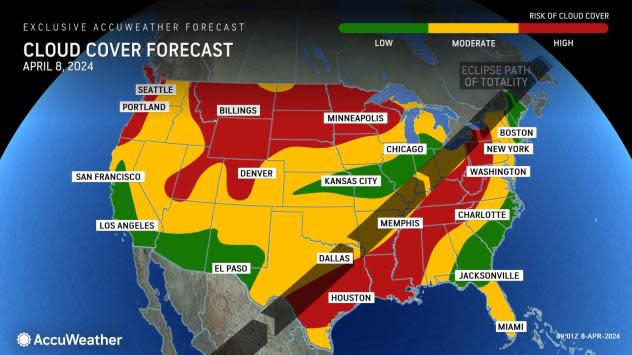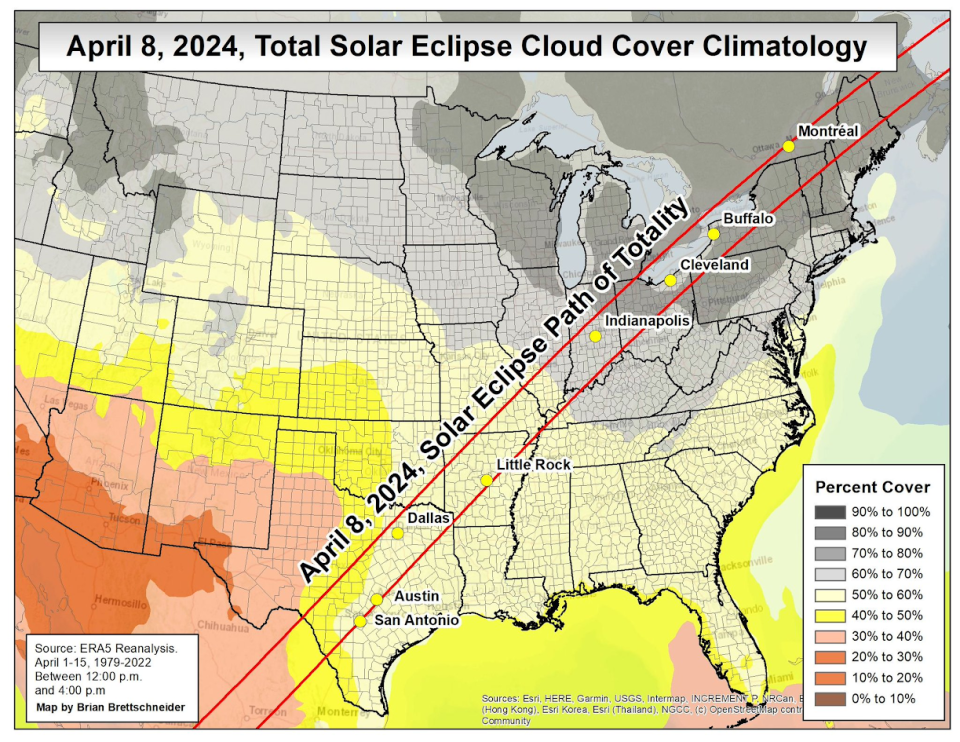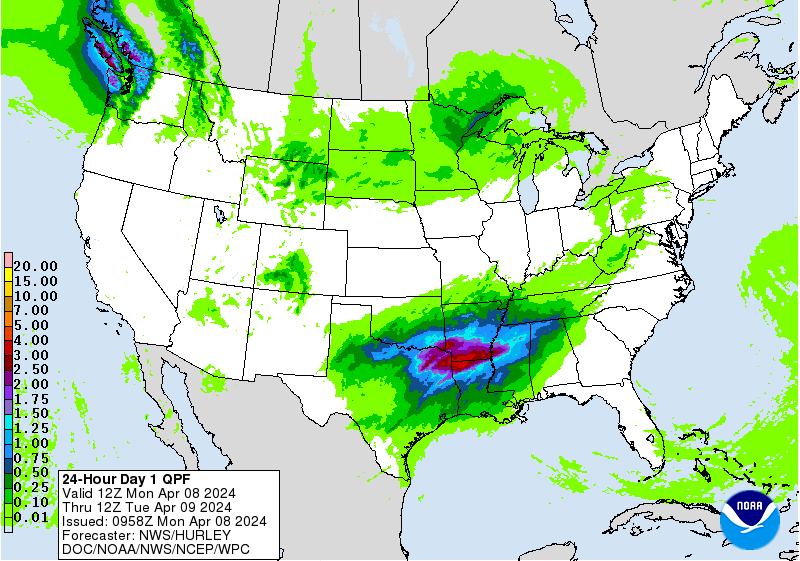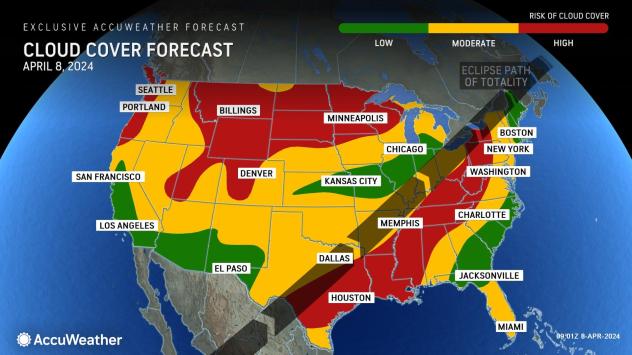While no rain is in the forecast, most areas across Florida are expected to see high, thin clouds overhead at the time of the eclipse this afternoon. While the view should still be good, there is a chance thicker clouds could move in at the wrong time.
Florida isn’t in the path of totality, but viewers in the Sunshine State will get to see a partial eclipse: Just make sure to wear your safety glasses.
The partial eclipse will take place roughly 12:35 p.m. CDT through 4:20 p.m. EDT. The peak will happen about 1:55 p.m. CDT in Pensacola and 3:02 p.m. EDT on Miami Beach.
Here’s the latest weather forecast on what to expect.
AccuWeather forecast: Will clouds block Florida’s view of Monday, April 8, 2024, solar eclipse?

There’s a low chance for clouds across eastern portions of the Panhandle and Northeast Florida, according to AccuWeather.
Across the remainder of the state, there’s a moderate chance for clouds to affect your view of the eclipse.
AccuWeather meteorologists warned severe weather is expected to ramp up across the southern U.S. A cold front started pushing across the Mississippi Valley Sunday, igniting a line of thunderstorms, some of which brought hefty downpours and hail.
➤ Where will clouds spoil the eclipse?
National Weather Service Florida forecast for Monday, April 8, 2024, solar eclipse


Here’s the forecast for Florida as of Monday morning from the National Weather Service.
-
Panhandle: “It does look like we’ll have some high-level clouds streaming across the region, but there will probably be breaks in the clouds,” said Rudy Dicarlo, meteorologist with the National Weather Service Mobile. The thin cirrus clouds should allow residents to see parts of the eclipse.
-
Northeast Florida: “There should be 50% cloud coverage at the time of eclipse today, but they’ll be some thin cirrus clouds, which shouldn’t obscure the eclipse,” said Ben Nelson, meteorologist with the National Weather Service Jacksonville. “There is a slight chance of lower-level clouds moving in. If you want to slip over the border into Georgia, less cloud coverage is expected there, Nelson said.
-
East Coast, Central Florida: “We’re expecting a band of high clouds to move into northern half of our coverage area, roughly extending from Tampa/Vero Beach north through Daytona Beach,” according to Jared Heil, meteorologist with the National Weather Service Melbourne. “There will be breaks and the clouds will be thin enough to see the eclipse. There will be periods to catch glimpses of the eclipse but it will be hit and miss, especially if slightly thicker clouds” are overhead at the peak time of the eclipse in mid afternoon. “The Treasure Coast and Okeechobee will be brighter, with fewer high clouds, but some puffy, cumulus clouds could move in from the Atlantic, especially along the coast.”
-
South Florida: The best view will be along the west coast, with scattered cloud cover expected along the east coast today, according to Will Redman, meteorologist with the National Weather Service Miami. “A lot of people are going to be able to see something, but it will be hard to see much on the east coast, Redman said. “It’s still worth a try since it comes so infrequently.”
-
Southwest Florida: In Southwest Florida, there weren’t any clouds at 7 a.m., but some high, cirrus clouds could move in by the time of the eclipse this afternoon. “Viewing should be OK,” said Paul Close, meteorologist with the National Weather Service Tampa Bay, who added there would be more clouds the farther north you go in the state.
NOAA’s precipitation outlook for Florida


Have some fun as you take our eclipse quiz to see how much you know
Can’t see the quiz? Open in a new browser.
Countdown clock to 2024 solar eclipse
What time will the solar eclipse be visible in Florida?
While Florida isn’t in the path of totality, residents will be able to see a partial eclipse. Here’s when you can watch the eclipse from any Florida location.
Click on your location in the map to see:
-
When the eclipse starts at your location
-
What the maximum coverage will be
-
What time maximum coverage will occur
-
When the eclipse ends at your location
-
Chances for clear skies based on historical averages for April 8
Roughly speaking, the peak of the eclipse will happen about 1:55 p.m. CDT in Pensacola and 3:02 p.m. EDT on Miami Beach.
Can’t see the map? Open in a new browser.
➤ See exact times to go outside to see the eclipse across Florida
Interactive map: Enter your ZIP code to see the best times to view the eclipse across Florida
Can’t see our graphics? Click here to reload the page.
Enter your ZIP code to see:
-
When the eclipse starts at your location.
-
When the peak coverage will be.
-
What the peak coverage will be.
-
When the eclipse ends.
-
How long the partial eclipse will last.
-
How are you are from the path of totality.
The time lapse graphic shows what the eclipse will look from Orlando.
This article originally appeared on Treasure Coast Newspapers: 2024 solar eclipse Florida: Latest weather, cloud forecast
